 Artetsu Saria 2005
Artetsu Saria 2005
Arbaso Elkarteak Eusko Ikaskuntzari 2005eko Artetsu sarietako bat eman dio Euskonewseko Artisautza atalarengatik
 Buber Saria 2003
Buber Saria 2003
On line komunikabide onenari Buber Saria 2003. Euskonews
 Argia Saria 1999
Argia Saria 1999
Astekari elektronikoari Merezimenduzko Saria
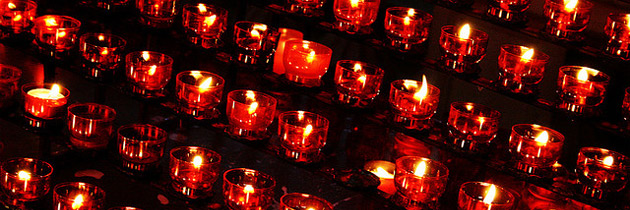
W. Thomas FAUCHER
I begin these remarks by giving credit to some of the people whose works, published and unpublished, made my comments here today possible. These include but are not limited to Argitxu Camus Ethchecopar, Msgr. William Stone, Bishop Edward J. Kelly, Abbot Cyprian Bradley O.S.B. and Father Wilfred. P. Schoenberg, S. J. I must also thank the many Basque people who have graced my life and who have shared with me their spiritual lives and journeys, as well as numerous priests and religious with whom I have discussed cultural spirituality.
The 1990 Study of the Roman Catholic Diocese of Boise contained the followed words: “All people live in a culture. For some Americans the surface culture of Americana is also their own culture; but for others there are cultural strains that are part of their essence. For these people the average American cultural experience, especially the experience of church, is not the totality of what they need to able to praise and thank God.
“This is the basis of cultural ministry — the acknowledgment that people need to pray and worship in their own culture. Among those people who have a language that is not the same as the generally used language, the need for cultural ministry is all the more apparent.” [Green Study Book 2, p.73]
The history of Roman Catholicism is a patchwork of efforts which recognized cultural spirituality, such as the work of St. Patrick in Ireland and St. Boniface in Germany, and efforts which did not, such as the Roman rejection of the ministry of Matteo Ricci in China.
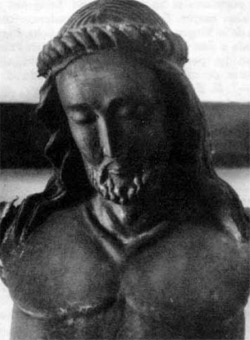
A Basque, Bavarian or Italian understand God, religion, Jesus Christ, the Blessed Virgin Mary and all the other aspects of Catholic life in a very different way than an Irish or Polish catholic does.
Cultural spirituality, in its most simple description, is the way in which a people understand their relationship with God. This understanding is a constantly evolving reality based on and changed by the historic events through which a cultural have lived. Thus the cultural spirituality of the Basques is very different from the cultural spirituality of the Irish. The cultural spirituality of native Americans is very different from that of natives of the Indian subcontinent, and the cultural spirituality of northern Germans is different from that of southern Germans.
What is different in all of these spiritualities as it relates to Roman Catholicism, is that while there may be agreement about the Creed, the sacraments, and the other essential doctrines, the lived reality of what those doctrines mean on a practical level is not the same.
Since cultural spirituality is not the major point of my words today I do not want to go too deeply into this subject, and I will bring it up again, maybe what would be best is to simple give some reasons for the differences and some examples.
Obviously the most critical factor in a cultural’s understanding of God as they became converted to Christianity was the understanding of God they had before their conversion. There is a tendency to view European tribes and cultures before their conversion to have had similar pagan religions.
This is not correct. The variety of pre-Christian pagan religions in Europe was vast. Northern European cultures such as the Vikings saw their gods very differently from southern Europeans. People of Celtic cultures had religious traditions, especially those served by druids, were very different from those with no Celtic backgrounds.
The second most important component in the development of cultural spirituality is persecution or religious oppression. Cultures which have been persecuted such as the Irish, French Huguenots, or Spanish victims of the inquisition do not view God or religion in the same way as Basques, Bavarians, or central Italians, who have never been victims of persecutions.
Practically speaking, a Basque, Bavarian or Italian understand God, religion, Jesus Christ, the Blessed Virgin Mary and all the other aspects of Catholic life in a very different way than an Irish or Polish catholic does.
It is precisely these differences which will produce profound effects on the history of the Basques in the western United States.
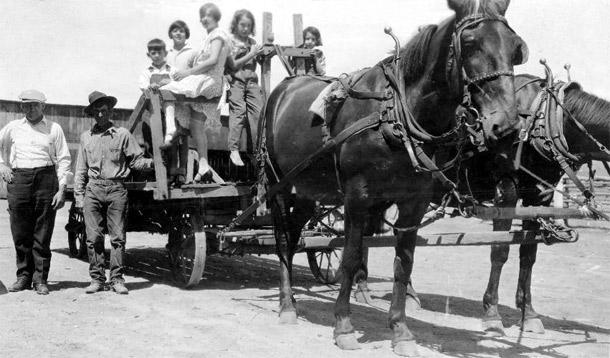
The Catholic Church in Europe viewed the emigration phenomenon as a real danger for the faith of those who departed and it therefore publicly reacted negatively to that phenomenon.
The Roman Catholic Diocese of Boise, which encompasses all of Idaho was established in 1890, with the first bishop as Alphonsus Glorieux, a Belgian native who had served as administrator of the Idaho Vicariate before Idaho became a diocese. He was succeeded in 1918 by Bishop Daniel Mary Gorman, an Iowa native who served until his death in 1927.
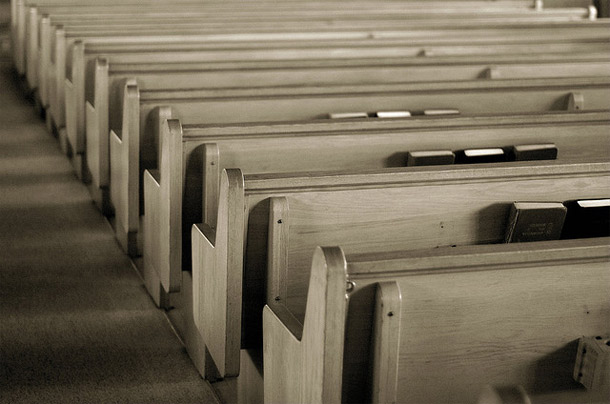
The Roman Catholic Diocese of Boise, which encompasses all of Idaho was established in 1890.
Photo: CC BY - silent shot
The Roman Catholic Diocese of Baker was established in 1903, taking the eastern two thirds of the Archdiocese of Oregon City. The first bishop was a Portland priest, Charles O’Reilly.
The History of the Diocese of Boise says, “Numerous Basque people the wide sheep ranges of southern Idaho... They were Catholics in their home lands, and the possibility loss of their faith in a foreign land, who language they knew not, gravely troubled the apostolic Bishop Glorieux. He arranged with the Bishop of Vittoria in Spain for the services of a Basque priest, Rev. Bernardo Arregui, who arrived in Boise July 11, 1911. The Bishop placed the priest at the cathedral, when he could attend the spiritual need of his Basque countrymen scattered among southwestern Idaho.” (p .307)
After a request from Bishop O’Reilly to Bishop Glorieux, Father Arregui soon also took on the responsibility of the Basque colony in Jordan Valley, Oregon.
The Idaho history goes on to say, “The first church established by Bishop Gorman was that of the Good Shepherd in Boise... and placed the charge of Father Arregui.” (p. 341)
The majority of priests in Idaho and Eastern Oregon in the early years were from Belgium. They served well with the incoming Basque immigrants and understood the complexities of long months as sheep herders and the role of the Basque Boarding Houses in providing a sense of home. Together with Father Arregui these priests made the early part of the twentieth century a positive time for Basques, especially in the city of Boise.
In 1928, Bishop Edward J. Kelly, a native Oregon from Irish background who had been educated in Rome, became the third bishop of Boise. In one of his early actions he closed the Church of the Good Shepherd as a Basque chapel and converted it into his private chapel. The Basque people were told to go to the cathedral parish.
At the cathedral and in many other places in Idaho (and Eastern Oregon) the original missionary priests were being replaced by priests born and educated in Ireland. This background, and the new Roman mentality of less support for ethnic churches, joined with a “nativist” mentality in many American Catholics questioning why some ethnic groups had their own churches and other did not. Bishop Kelly and many of the Irish priests were opposed to what they perceived as special treatment for the Basques.
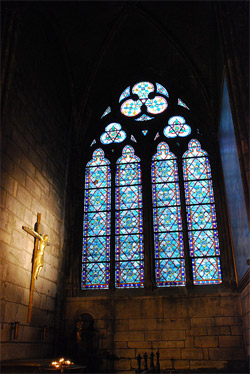
What is essential to understand about the service the Basques priests could provide was an understanding of Basque spirituality.
Photo: CC BY - McPig
Beginning in the later 1920’s and continuing until the 1970’s the Basques were at best treated as simply another ethnic group, and at worst discriminated against both inside and outside the Catholic church in Idaho and Eastern Oregon. The tensions which caused much of these difficulties will be discussed in the next part of this talk.
During the 1960’s the original Church of the Good Shepherd, which even as the bishop’s chapel was held great reverence by the Basque people of Boise, was remolded into a church office building. Unknowns to the bishop at the time the original furnishing of the church were salvaged and stored a local parishioners garage. Finally in the 1980’s the building was sold to become a layer’s office in spite of a movement to allow local Basques to buy it.
In 1984, as part of the renovation of Sacred Heart Church in Boise, the new day chapel was built as a Basque chapel with an imported statue of Our Lady of Begonia, which rests on the original altar from the Church of the Good Shepherd. It is the only Basque chapel in Idaho.
In the 1974 a forty year string of Irish pastors at the cathedral in Boise ended with the appointment of an Idaho native of German ancestry. During this time the Basque people were well served by many good and loving Irish priests, but there was no acknowledgment of Basque heritage or culture allowed.
Finally beginning in the early 1980’s Mass begin to be celebrated in Basque on the Festival of San Ignazio using ritual books brought back from the Basque country by one of the Idaho priests. The celebration of the Oñati Dances began as another part of that ceremony, and the Idaho church began to honor its Basque heritage.
On a lesser scale much of the same things happened in the Diocese of Baker, with Basque celebrations in Bend, Burns, and Jordan Valley beginning to happen as newer priests came onto the scene.
One note of interest is that there has never been a man of Basque heritage ordained as a priest in the Diocese of Baker, and both of the Idaho Basques who were ordained priests chose to move on to other professions.
I speak in this section as an Idaho native and a priest of almost forty years. Much of what I will say is both undocumented and probably undocumentable.
I grew up, entered the seminary, and became a priest in a church with a variety of strong Irish priests who dominated and ruled the diocese. My own ethnic background is half French and half Irish, which gave me access to many of these priests. The fact that I grew up in a neighborhood which was very Basque made me keenly aware of the Basque culture.
My childhood pastor and mentor in priesthood was an extraordinary man named John Creegan who had been born of Irish immigrant parents in New York City, raised in Ireland after the murder of his father, and then at the insistence of his uncle who was already an Idaho priest, did his seminary training in the United States. He was both very Irish, yet was able to speak about the Irish priests with objectivity.
He enjoyed the fact that many of Irish peers were deep personal friends, and yet a few of them could not stand him. He was famous for being open, kind, and understanding, and he was deeply grateful for his American Seminary training.
Msgr. Creegan’s main objection to many of his Irish fellow priests was that they were too severe. He felt that the Irish church’s Jansenistic heritage, coupled with the severity of Irish seminary training made many of the priests become too hard, too severe, too uncaring of the weaknesses of the people they served.
One of Msgr. Creegan’s best friends was Father George Brennan, a native Irish priest, who became the only Idaho priest to ever learn Basque (other than the two native Basque priests). More than once I was present when other priests questioned George about why he had done this.
As one Irish priest said, “Basques just aren’t good Catholics. They don’t fear the priest, they do as they please, they don’t take orders. They don’t feel guilt. I don’t think they even fear God.”
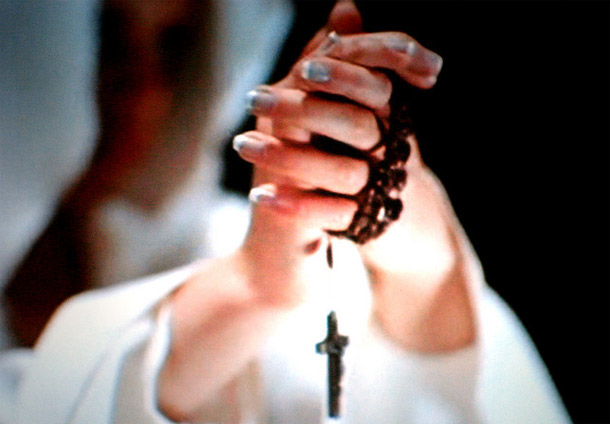
Basques negotiate with God. They view God as God. By no means their equal, but as their much stronger partner in life. God has his responsibilities and they have theirs.
Photo: CC BY - Peyman
Fr. Brennan response, echoed by Msgr. Creegan, was that they just understood God very differently than did the Irish. On one occasion we were joined by Father Ramon Echeverria, one of the Idaho native priests who later left, who was himself a fine theologian. He tried to explain how Basques think, feel, and understand all of life differently than many other peoples.
While none of these man used the phrase “cultural spirituality” I realized later that we were really discussing that subject. There is a very definite type of spirituality which I call Basque spirituality. Have lived with Basques all of my life, and done thousand of their baptisms, weddings, and funerals, I have come to know, love, revere, and envy that spirituality.
Fundamentally the Irish priest was correct — the Basques do not fear God. They do not see God as an ogre, they do not see God as out to get them, they do not see God as waiting for them to trip up. They have none of the over riding sense of shame often associated with the theology of Saint Augustine of Hippo.
Basques negotiate with God. They view God as God. By no means their equal, but as their much stronger partner in life. God has his responsibilities and they have theirs.
Taking into account all the issues of life, the Basque will do what he or she can do, and do it as well as they can. Then it is up to God to do his part. There is a great sense of personal responsibility in the spiritual life, as in all of life.
Taking this one step further, Basques respect priests, but seem them as only one part of a much larger spiritual universe. They need the sacraments, but not necessarily the priest who dispenses them.
Where this ran into problems with the Irish priests was that Irish priests need to be needed. In Irish spirituality the priest is the connection between God and the people. Irish spirituality has a very strong sense of guilt, of unworthiness, of shame.
As one looks at cultural spirituality, this sense of guilt and unworthiness can be found in all the Celtic cultures. I think is closely connect with the religious beliefs of druiditic times. Coupled with Augustinian negativism, this was the background which found Protestantism so meaningful. Almost every Celtic culture took to Protestantism very easily — Scottish, Welsh, Limousin, Breton. All but Ireland. It was hatred of the English which kept Ireland Catholic, but they created a Catholicism which was uniquely severe.
I am not saying that we Irish are not good Catholics. We are great Catholics. But we are different Catholics than the Basques are Catholics. We really do understand God differently.
Some Irish priests, especially those who were not the best of people to begin with, saw themselves as men who had come to serve and who “had given their lives over to God in selfless service to the unworthy faithful.” When these same priests ran full tilt into people who didn’t pay much attention to them, who didn’t revere them, who didn’t fear them — these priests reacted.
There is a famous letter in the 1930’s from the Irish pastor in Emmett, Idaho, to Bishop Kelly complaining that after the closing of a lumber mill in Barber, Idaho, over fifty Basques families had been transferred by the lumber company to Emmett. The priest write, “It was bad enough before, but now there are Basques here. You know the Basques. They smell of garlic, they don’t speak English, and they don’t do what I tell them to do. Bishop, how in God’s name can you leave me here in this hell hole with people like that?”
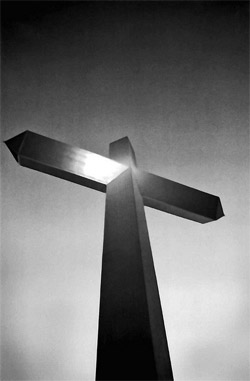
Photo: CC BY - Glen’s Pics
During the time of domination of Irish priests who did not care for the Basques, many Basque people in more rural areas gradually fell away from the practice of their faith. In areas such as Boise, with many Basques, the strength of Basque culture enabled people to continue to live out their faith on a more subdued level. Basque spirituality does not give great attention to the institutional church, or to the parish as an institution. Basque people often love their parishes, but to this day resist more than any other group being on the Parish Council or serving as lectors or Eucharistic Ministers. As an old dear Basque friend of mine said recently, “Tom, always remember that the church is just a necessary evil.”
I want to finish this section with a true story about Basque spirituality. On December 7, 1941, in addition to the bombing of Pearl Harbor, the Japanese attacked Wake Island. They took many prisoners, including many young boys from Idaho who had gone to Wake to work for Morrison-Knudsen Construction Co. One of these was Joe Goicoechea.
His mother, Elaedi, as soon as she heard the news of her son’s capture, began the practice of walking on her knees the two blocks from her house to the bishop’s chapel, the old Basque church. She did this, summer and winter, for the four years he was in Japanese prisons, always assuring everyone that he was still alive and would return home. He was alive and he did return home where he is a good friend of mine to this day.
When asked what the walking on her knees to the church meant to her, Mrs. Goicoechea did not talk about suffering or guilt or self-punishment, concepts often connected with those who do that kind of devotion. She simply said that she wanted two things from God. The first was to know if Joe was alive and how he was doing all of the time, and the second was for him to come home alive. Her part of the “negotiation” was then to do something which would show God she was serious and living up to her part of the bargain. Walking on her knees to church just made sense.
As I conclude these remarks, I want to make some observations. First of all I want to thank all of the priests, Basque men and women, and all of those who have taught me so much about cultural spirituality. This includes those from my time in Wales, Scotland, the Limousine area of France where my ancestors lived, and many others. I have found that with the right questions asked the answers give an extraordinary picture of cultural spiritual diversity. It is an area of life I truly think deserves much more study and understanding.
I will go one step further and beyond Christianity. I have a number of close friends in Turkey and other Muslim countries. The same cultural spiritual diversity exists in Islam and I presume other major religions as well. With rare exception Islamic Turks are not militant, while many Islamic Saudi Arabians are. If we could understand the difference it would make the world a better place.
Secondly, here on the campus of Boston University I want to share my view of Jesuit spirituality and specifically the works of San Ignazio [Saint Ignatius]. I do this as a former associate fellow of the Woodstock Center at Georgetown, and as someone who had Jesuit associate pastors working with me for over ten years.
Inazio was a child of privilege. He had grown up wealthy and a military man. Then, while recovering from an injury, his life was changed because his values changed. He did what Saint Paul said to do, put a relationship with Jesus at the center of his life. With this foundation he founded the Jesuit order and truly changed the world.
But I think Inazio had an incredible advantage in all that he did. He was Basque. This meant that he did not have a fear of God but a deep respect for God. Nestled in this respect for God is a expectation that God has a respect for the person as well. There is no idea of equality with God, for God is always God and we are always his creatures, but the covenant between God and his people gives obligations to both sides. God promises to shower us with this gifts, and we promise to both be grateful for these gifts and use them well.
This is the basis of Jesuit spirituality. When looking at the lives of Inazio, Gonzaga, and Loyola, one can easily see the qualities of Basque spirituality in their entire approach to life and to God. Going further, I think far too little attention has been paid to the Exercises of Inazio as simply a toned up, well written, fancy version of basic seventieth century Basque spirituality.
When all is said and done, I think a mature, spiritually alive Jesuit priest is simply a Basque peasant with a great education in an ill fitting suit.
Comments:
comments powered by Disqus